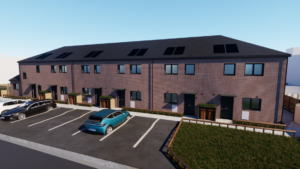Owenstown and the new garden city movement
 Across Europe, austerity measures have been in force to bring expenditure in line with revenue and rebalance the books. While most people would accept that spend needs to be kept under control, there has been a real sense of unease about the consequences of the cuts and the relative increase in the cost of living.
Across Europe, austerity measures have been in force to bring expenditure in line with revenue and rebalance the books. While most people would accept that spend needs to be kept under control, there has been a real sense of unease about the consequences of the cuts and the relative increase in the cost of living.
Simultaneously, in certain geographies, there has been supply/demand and resultant affordability problems in the housing market. This has given rise to an interest in considering new models and revisiting old ones as an alternative means of addressing market failure, improving standards of living and addressing far wider societal issues.
Owenstown is being promoted by a foundation, a Scottish charity set up by a small group of philanthropic businessmen in south Lanarkshire. The foundation has the single goal of ‘assisting with community development through co-operative and sustainable principles’ and believes that ‘local communities become stronger by having greater control over things that are important to them’.
The foundation also accepts there must be something better than current social and economic models and that new approaches must be adopted to address not only the physical and financial aspects of the housing crisis, but also wider socio-economic systems in which they sit.
Owenstown is a pioneering proposal for a new settlement, a holistic and practical evolution of the original garden city concept, espoused by city fathers such as Ebenezer Howard. The model builds on the ‘value capture’ model – which captures the uplift in land value as deployed at the new town of Letchworth in 1903 by Howard – but also provides a wider social and economic philosophy based on co-operative principles.
The approach embraces the garden city model as a sound starting point, but then incorporates ideas from social reformers such as Robert Owen and contemporary co-operative theories, in order to make greater steps towards a ‘better and fairer society’. It recognises the value of ownership, horizontal democracy and active citizenship.
Owenstown fully joins the dots between two approaches – the garden city movement and the co-operative movement. The important aspect of the approach being adopted at Owenstown then is the relationship between what is being delivered – a planned garden city settlement – and how it is being delivered, by co-operative means. This provides the fertile and untapped interplay that gives rise to the wider social, economic and financial benefits derived. For example, the move away from a linear economy to a local, circular economy, as outlined by Howard in his book Tomorrow (1902).
 The proposal, then, is to build a co-operative settlement which will be self-contained, self-funded, self-governed and self-owned.
The proposal, then, is to build a co-operative settlement which will be self-contained, self-funded, self-governed and self-owned.
Adopting a more co-operative governance approach would allow greater scope for a self-reinforcing system, recycling products and finance and introducing increased cycles of efficiency. Many global companies are supporting this approach by applying it to their businesses, including the Ellen MacArthur Foundation. Equally the approach can be applied to activities in the context of a housing settlement.
A 2,000 acre site was acquired for Owenstown adjacent to a fragile ex-mining community in south Lanarkshire. The concept has been developed over a five year period but after 14 months in the planning system, the planning application was refused by South Lanarkshire Council in April. The main reason for the refusal was that the development was not included in the local development plan. The trustees view that a project of this scale and ambition would not be in the local development plan, but that, given the national significance of the project, the plan should be changed to accommodate the initiative.
Discussions are now taking place with the Scottish government given the substantial investment that could be derived from the project – some £500m – with no contribution requested from the public purse. Following these discussions, the trustees will decide whether or not to appeal the local planning decision or not.
In the meantime, the Owenstown team is exploring other sites in the London, Cambridge and Dublin areas, where there has been more positive reactions to the proposals.
Owen’s radical ideas, social reform and driving ambitions often came up against resistance and criticism. Regardless, in his generation he was viewed, as he still is today, as a man ahead of his time. Now 200 years on from the publication of one of his key works, A New Vision of Society, our society is still suffering from the same ills, and, in many quarters, there remains resistance to progressive thinking.
- For more information visit www.hometown.co.uk















